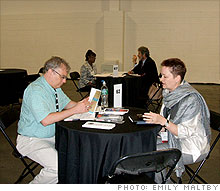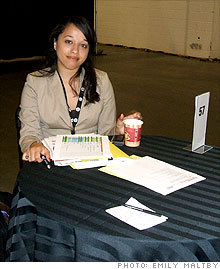Business Matchmaking: Speed-dating for contracts
At networking events around the U.S., entrepreneurs can meet officials from government agencies and major corporations and learn how to bid on lucrative deals.
 |
| Diane Paparo (at right) pitches her interior design company to a representative from the Department of Veterans Affairs. |
 |
| Sarah Abdelrahim of the National Oceanic and Atmospheric Administration, reviews the list of small companies she'll meet throughout the day. |
SECAUCUS, N.J.�(CNNMoney.com) -- At the sound of a bell's "ding!," the floor of a cavernous expo hall swirls with movement as entrepreneurs in power suits scurry to find their next assigned table. There, a small business procurement officer waits to hear their pitch. The next bell will be in 20 minutes -- a brief window of time, but long enough to potentially kick off a lucrative business relationship.
The government is required to award 23% of its contracts to small businesses, but getting a foot in the door and navigating the federal bureaucracy to actually land one of those business deals is a daunting challenge. On Wednesday, hundreds of entrepreneurs in the New York area gathered at a business event intended to demystify the process.
"We say how important small business is, that it's the backbone of economy, but it's hard for them go gain access to buyers," said Hector Barreto, a former administrator of the Small Business Administration and an attendee at this week's gathering. "At the least, it's because of burdensome paperwork, but at the worst, it's humiliating because all the opportunities are in D.C. It's like looking for needle in haystack."
Even before Barreto arrived in Washington, he saw the difficulties business owners had in finding contracting opportunities, so he began organizing networking activities to introduce large corporations to small businesses. Once at the SBA, he expanded on the idea and brought government agencies into the mix.
Now, six years later, the nonprofit organization Business Matchmaking holds events around the country to educate small business owners and help them network with potential customers, speed-dating style. At this week's gathering in Secaucus, N.J., just outside of New York City, 270 small businesses met with nearly 90 buyers, split evenly between government agencies and the private sector.
"The idea is that we can put the business owner in front of someone interested in his product or service," explained Barreto. "At the end of the day, no one can guarantee a contract, but the buyers can inform the business how to try for it."
While the event is free, it's not a free-for-all. Participating small businesses have to meet eligibility requirements, including having a DUNS number and registering with Central Contractor Registration, the government's primary vendor database. Event organizers pair small businesses with buyers based on the services offered and needed on each side of the table.
"We see a mix of businesses, both newbies and old veterans. When they sign up, they get prepped so they can take advantage of every minute of face time. They have no time to waste," said Denise Rodriguez-Lopez, former director of the Small and Disadvantaged Business Utilization Office at the U.S. Department of Transportation. "Sometimes we can see a perfect fit and then point them specifically in right direction. But even if the match isn't good, we can suggest where to go at another agency."
Business Matchmaking is sponsored by SCORE and several major corporations, including American Airlines (AMR, Fortune 500), Microsoft (MSFT, Fortune 500), Hewlett-Packard (HPQ, Fortune 500) and American Express (AXP, Fortune 500). Organizers estimate that $7 billion to $8 billion in contracts have been procured over the past three years from connections made at the networking events, based on data from surveys filled out by past attendees.
Michael Nicholas, a repeat visitor who flew in from Denver to attend this week's event, has received a fair share over the years.
Nicholas' company, NIMS Services, markets fuels and other mechanical fluids. He has acquired four major contracts from the likes of Lockheed Martin and the government's Defense Energy Support Center, which collectively bring in revenue of $6 million a year.
"I launched the company seven years ago, but after two years in business, I started attending the matchmaking events. It was a pilot program at the time -- I had heard about it through the local Denver SBA office and decided to go because it was targeting minority-owned businesses," he recalls.
That was in 2004. Though he didn't leave with any contracts that first time, he took away information that helped him better prepare for the next event. "I learned, and am still learning, the do's and don'ts," Nicholas said. "I learned the language -- what to use and what to not use. I learned through the people I met -- they are straightforward and responsive to the 'how-to' questions."
Some of the buyers, new to the event, were learning as well. The National Oceanic and Atmospheric Administration attended because some of the agency's programs are switching from grant-based projects to contracts. "That transfer has us looking to work more with businesses, which are typically more familiar with the contract processes than academic institutions," said Sarah Abdelrahim, who is involved in a climate research program.
Looking down her day's agenda, Abdelrahim remarked, "I'm meeting 13 businesses today and they are more varied than I expected. But I see, for instance, an aluminum producer that can perhaps provide us with instrumentation to do research. And even if they can't serve my programs, it's a huge agency and I can direct them."
That's all some entrepreneurs expected. "I don't have delusions that I'll leave here with a contract. But I can make direct contacts to follow up with who have tangible leads," said Diane Paparo, who runs Diane Paparo Associates, a space planning and interior design firm in Manhattan.
Paparo started her company in the early '80s, focusing on large-scale space planning for corporations. But the CEOs started bringing her into their homes in the wealthy suburbs of New York, and her business model shifted more toward interior design. Unfortunately, that aspect of her business has been hit hardest by the recession, as clients reconsider the price they're willing to pay for luxury items.
"The size of projects now is smaller. People have realized they can live in 8,000 square feet rather than 15,000 square feet," she said. "As the clients are revisiting budgets for things like faucets, I had to downsize staff and move offices and cut expenses. So now I'm seeking government contracting to even out the business model."
That's a smart move -- while corporations cut back, many government agencies are investing in new initiatives.
"The economy is impacting everyone, but the government has to keep operating and has to do procurement -- and it pays on time!" said the Department of Transportation's Rodriguez-Lopez. "And the federal government buys everything. They buy fighter jets, but also security guard services and janitorial services."
Business Matchmaking's next event will be held in San Francisco on July 14. The organization will also hold events in Chicago and Boston in the fall. ![]()
Speed-dating for businesses
Procure your piece of the bailout
The saga of the SBA and set-asides
Start bidding for government contracts
-
The Cheesecake Factory created smaller portions to survive the downturn. Play
-
A breeder of award-winning marijuana seeds is following the money and heading to the U.S. More
-
Most small businesses die within five years, but Amish businesses have a survival rate north of 90%. More
-
The 10 most popular franchise brands over the past decade -- and their failure rates. More
-
These firms are the last left in America making iconic products now in their twilight. More











